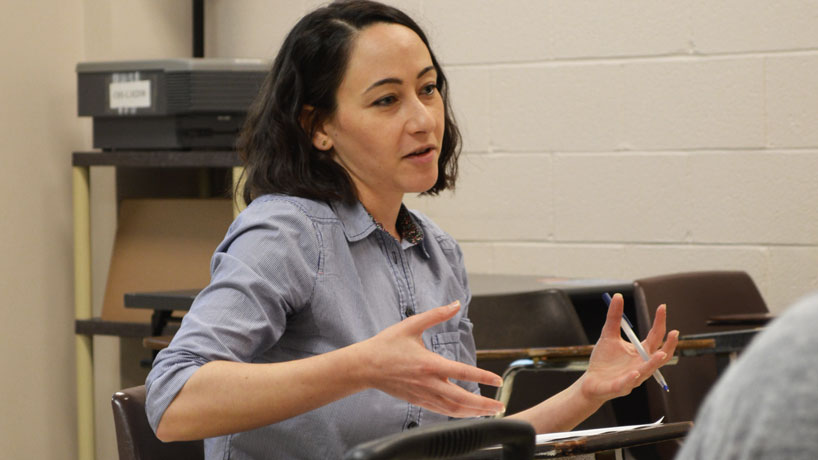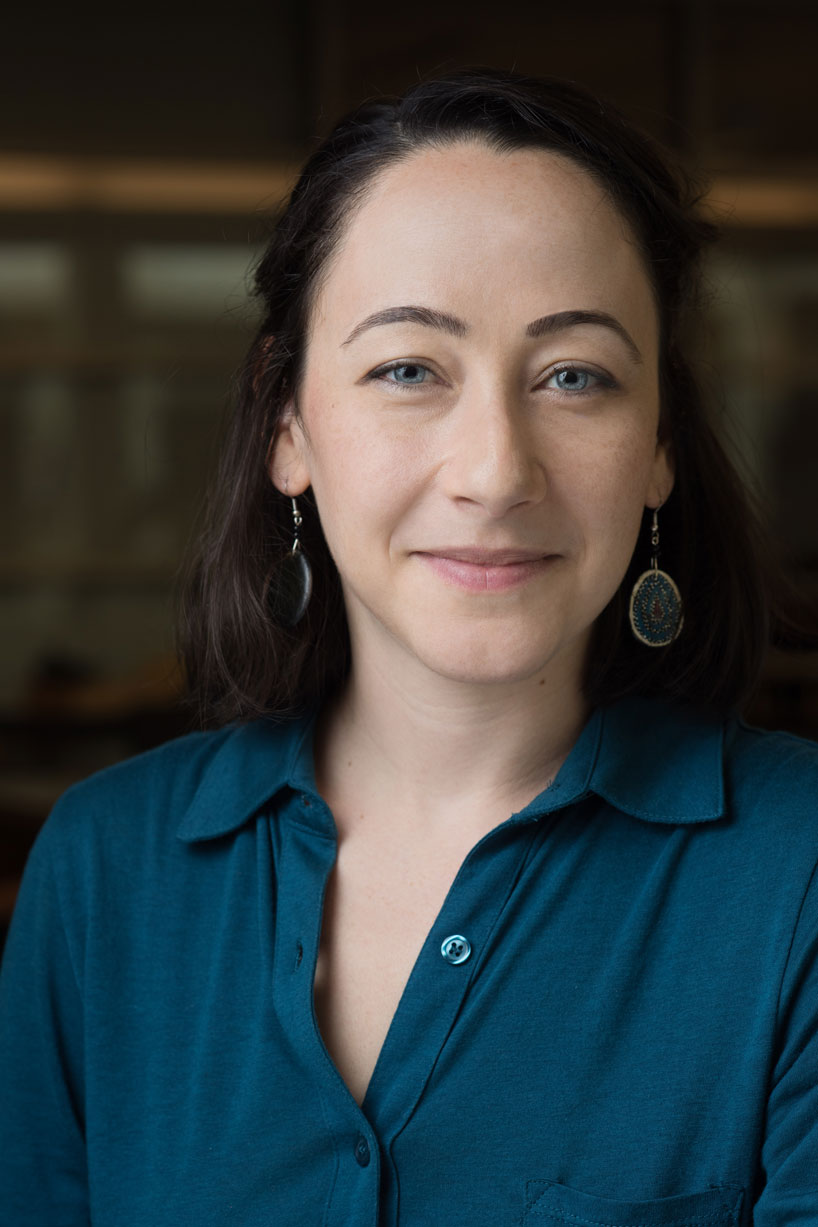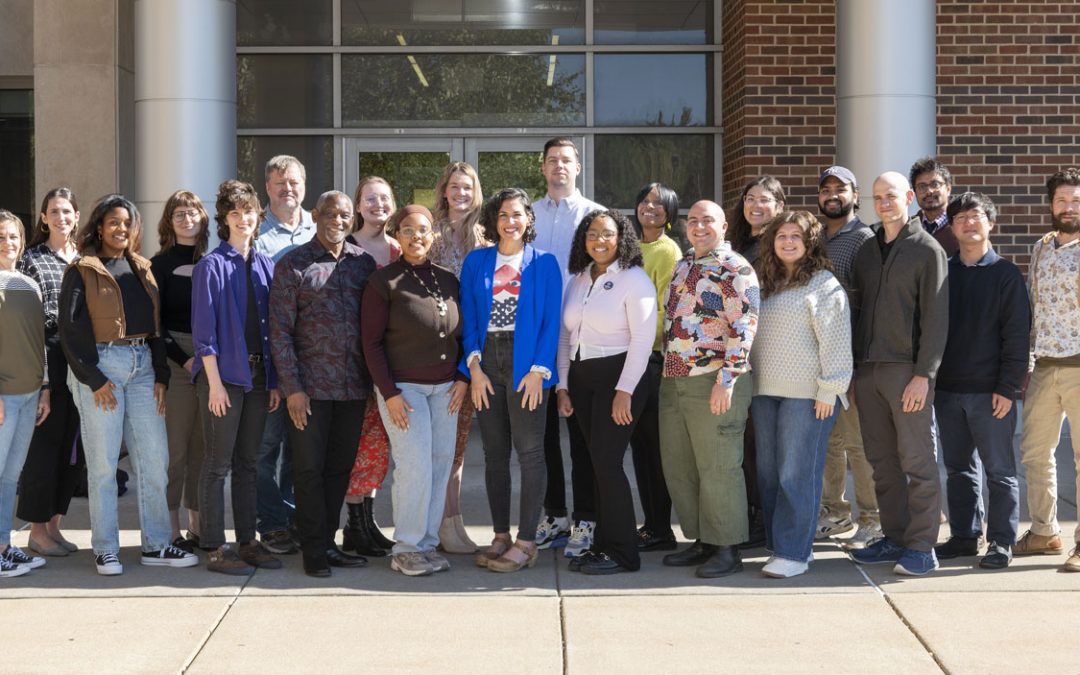
The assistant professor of history joined UMSL’s faculty two years ago, bringing to campus a focus on the intersections of local and global development, particularly in Africa. (Photo by Evie Hemphill)
Room 208 inside Lucas Hall surely ranks among the more humble instructional spaces on the University of Missouri–St. Louis campus. But the lessons so often underway within its four ordinary walls span whole centuries and continents.
That’s particularly true one recent afternoon as a conversation skipping from chocolate to diamonds to elephants fills the classroom. Circling their desks, Kara Moskowitz and her Extractive Industries in Africa students start with a look at the impact of cocoa farming on children and the environment in Ghana, Mali and other areas of West Africa.
Matt Munro, one of 11 UMSL students enrolled in the course, is discussing a Fortune article shedding light on the topic and its connection to the chocolate products that so many Americans enjoy.
As he shares what he’s learned about the working conditions and volatile nature of the industry with the rest of the class, Moskowitz, a faculty member in UMSL’s Department of History, ties it back to course themes that the group has been exploring all semester. Cocoa is very different from diamond extraction, she points out, and yet so many of the issues are similar.
“You still see some of the same trends,” Moskowitz says.
The next student delves into corporate social responsibility and the lack thereof when it comes to the world of cellphones – another beloved product spurring questions related to international labor and exploitation.
“Cellphones are everywhere, just like chocolate,” the professor remarks after the student’s presentation, “but we don’t really think about what goes into the making of cellphones.”
“And these companies are all too happy to take their suppliers’ word for it,” the student adds.

Kara Moskowitz teaches courses ranging from African women’s history to decolonization and development. (Photo by Joe Martinez)
As the class session continues, many more industries come into focus. Some of the articles and presentations offer more positive outlooks and developments, such as electrical generation through wind and solar power in certain parts of the African continent and a drop in Chinese demand for elephant ivory.
The latter leads to further discussion about regulation, corruption and competing interests that the students have been studying for weeks – and a closer look at what it means to have an extraction-based economy.
For Moskowitz, these closing presentations are an opportunity to bring things full circle in the specialized course.
“It’s a chance to really see how the histories we have studied throughout the semester help us make sense of the present moment,” she says. “And it’s often a favorite exercise for the students.”
The session would appear to be a favorite exercise for the instructor, too.
A member of UMSL’s faculty since 2015, Moskowitz has researched many of these topics over the course of her career, which has led her from the U.S. to the U.K. and to East Africa, where she conducted archival and oral research as part of a Mellon Dissertation Fellowship.
Her expertise in local African history and economies brings new questions into the spotlight at UMSL. Moskowitz notes that many of her students have little exposure before college to the continent’s history, and the narratives they are familiar with tend to oversimplify things into problematic catchphrases like “tribal warfare” or “African dictators.”
“I am continually fascinated by just how much more complicated these histories are, and I deeply believe that it is important for students to understand this complexity,” she says. “So, though we study ethnic conflict, we also examine colonialism and explore everyday experiences of African peoples through marriage, farming and local politics.
“With this approach, students learn to humanize Africans and to think of them as average people making the best decisions they can in a context not always of their own making.”
While few of her students have visited Africa and it may seem far away, a course such as the extractive industries one allows them to connect important dots. Moskowitz aims to link historical case studies of export-oriented economies and exploitative colonial relationships in Africa with the role of Western demand.
“In linking extractive production to American consumption,” she says, “students can make connections between purchasing a cellphone or a diamond ring and the working conditions in the Congo or in Sierra Leone, for instance.”
Containing 54 countries, 11.7 million square miles and over 1.1 billion people, Africa can be a lot for students to take on as a subject matter. It’s also challenging for a professor.
On the one hand, Moskowitz explains, she needs to offer students a broad overview and narrative to make sense of the history. On the other hand, she doesn’t want them “to flatten an entire continent into a country.”
“I want them to hold onto Africa’s diversity,” she says.
Working to balance local, national, continental and global histories in her teaching, Moskowitz might one day have a class reading about French colonialism broadly and the next be exploring the autobiography of a Malian midwife who lived during the colonial period.
Whatever the subject at hand, she’s been delighted by the response from UMSL students, whom she describes as exceptionally engaged and eager to learn more.
“It’s been a complete joy to watch my students enthusiastically dive into topics they previously knew little about,” Moskowitz says.
She’ll be adding a new course to her repertoire this fall, titled African History through Fiction and Film.















